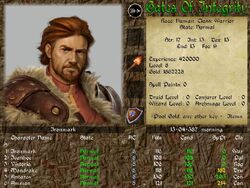RPG Codex Review: Shadowrun: Dragonfall
RPG Codex Review: Shadowrun: Dragonfall
Review - posted by Crooked Bee on Fri 14 March 2014, 17:37:57
Tags: Harebrained Schemes; Shadowrun Returns; Shadowrun: Dragonfall[Review by Darth Roxor, edited by Infinitron]
Shadows of Europe
Shadowrun Returns, with its Dead Man’s Switch campaign, was released last year and met with a resoundingly Good For What It Is™ reaction. Some people appreciated the effort that was put into the game and its ratio of price to content, while others regarded it as something rather half-arsed.
However, I think both groups were curious to see how the game's second campaign, which was set in Berlin and promised to be less linear, would turn out. The level of curiosity rose steadily as the Berlin campaign, which was dubbed Dragonfall, was postponed over and over again because Harebrained Schemes had decided to make it less of a “DLC” and more of an actual second campaign, rivalling Dead Man’s Switch in length and quality.
I was pretty hyped for it myself, because I found the original campaign enjoyable. I hoped that HBS would prove that man is actually a learning animal and iron out most of Dead Man’s Switch’s problems. Did they succeed? If you want to find out, read on!
The Re-Return of the Sixth World
There aren't a whole lot of new features in the game. In that respect, Dragonfall can be regarded as "SRR++". That is to say, there's simply more of everything. More guns, more spells, more mission variety, more cyberware, more pretty graphics, etc. Some of these additions are very welcome, like cyberware that's actually useful or revised chi spells, but others are ultimately still insufficient, especially melee and throwing weapons. Unarmed fighters now get access to brass knuckles - but there are only three types of them. Throwing weapons have also been expanded, and now include not just grenades but also low-tech weapons, which inflict low damage but allow many special attacks. Once again, however, there are only two types - throwing knives and shurikens. More equipment would have been greatly appreciated, but at least now it’s actually useful to assign Karma into some skills that were completely worthless earlier.
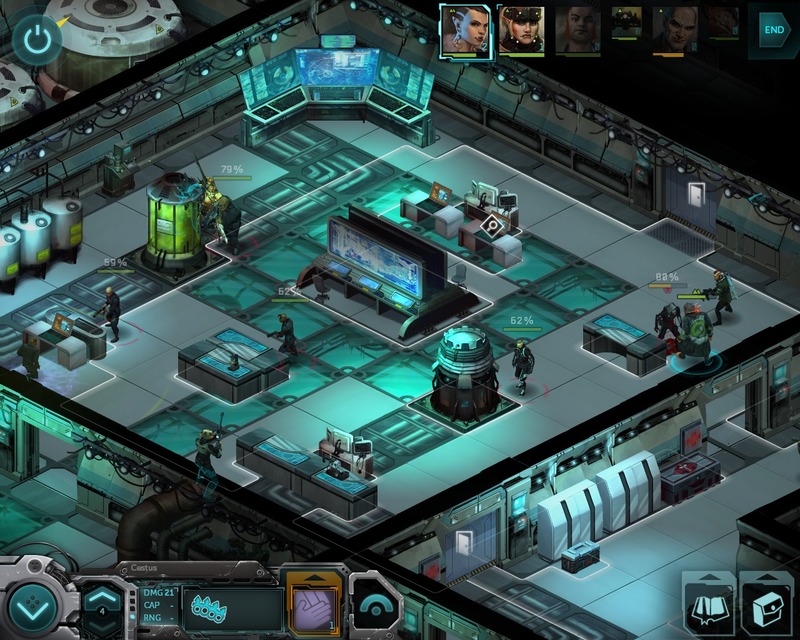
The game's party management has been greatly improved. You can now use your buddies to jack into the Matrix even outside of combat, smash through doors, hack consoles via the dialogue interface, etc. The companions you take along with you for each mission gain some more personality this way, and you feel like you are controlling an actual team instead of a protagonist with three combat bots. Speaking of terminals, the game now employs some interface elements from a more civilised era of gaming - namely, text parsers and keypads. If you want to search for something in a database, you now have to input the query manually, and the same is true for accessing anything locked with passwords and number combinations. This opens up the way for fun little mini-puzzles and info-mining sequences.
The last and most important addition is the inclusion of a savegame system. Yup, that’s right, no longer will you have to slog through checkpoints at the beginning of every scene, and no longer will you need to re-do entire levels because your PC crashed when boarding that elevator in Telestrian’s office. I was rather sceptical at first that the savegame system would be implemented properly - apparently, it was one of the main reasons why Dragonfall was continuously postponed, and so I was sure there was going to be some "catch" that would limit its functionality. Turns out there is no catch, and it works exactly like it should, hallelujah. You can save anytime, anywhere, in and outside combat, while the game still does autosaves/checkpoints of its own, and retains the ability to “rewind” your saves to previous checkpoints.

So...yeah. That’s all in terms of features, really. It might not look like much, and frankly, it isn’t. Most of Dragonfall’s differences and improvements over DMS lie in its overall campaign structure.
Nicht Schießen!
If there is one thing that I really like about Dragonfall in general, it’s how consistent it is, both in regard to its source material, and with its internal pacing. While DMS started as a cool noir crime story with bad combat and morphed into bollocks with nonsensical fan service and better combat, Dragonfall starts with an actual shadowrun, then sends you through plenty more shadowruns, and ends with a shadowrun.
Generally, this campaign is much more true to the traditional Shadowrun pen and paper experience than DMS was. You now have a fixer (a guy who handles logistics and job offers for you) in your safehouse, and a team of buddies instead of just mercs for hire. You can choose which missions you want to take, and there’s a hub with shops and NPCs outside your HQ. Mind you, it's all fairly simplistic - you never really have to perform your own legwork and intel gathering before going on a run, so don’t expect any open world business. Still, there's now significantly more “breathing space” and a sense of freedom between missions.
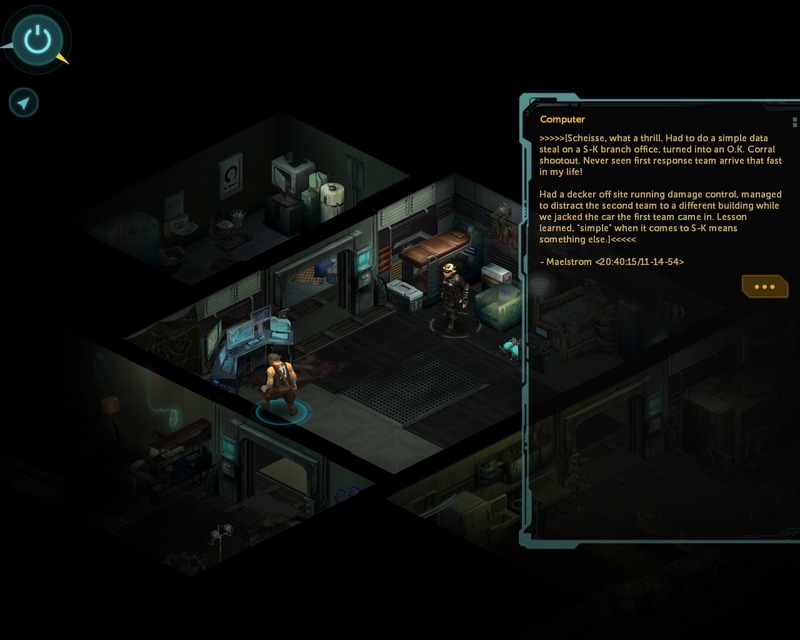
What exactly is there to do between missions, you ask? Obviously, shopping for gear, but you will also be inspecting your HQ’s computer for data and talking to various NPCs scattered across the hub. The safehouse computer is a neat little thing. Its primary use is to serve as a database of jobs you can take, but you can also use it to read emails from various people between missions, post stolen items and data for sale, and read the Shadowland BBS, a kind of a shadowrunner community network. The BBS discussions are only for flavour, but they imbue the game world with a tremendous amount of believability. Some of them are about your recent actions, but others are completely unrelated, creating the illusion that your team is only one of many out there in the shadows. The NPC dialogue in the main hub is also just for flavour for the most part, only rarely yielding a small side objective or additional karma. This holds true not just for miscellaneous NPCs, but also for your companions. I thought it was rather refreshing that I wasn’t forced to act like a personal therapist and listen to everyone’s life stories; if you find someone interesting, good, you can keep checking on them regularly. If you don’t, well, screw that guy.
Speaking of companions, the game offers a pretty colourful crew for you to choose from – a troll ex-commando, an oldguy punk band frontman turned shaman, a hotshot decker and a combat medic with cyberclaws and a Dark Past™. They seem a little Bioware-whiny and annoying at first, but become more likeable over the course of the game. You can influence their attitudes and decisions during your "therapy sessions", although you never have a hand in picking their gear and skills, except for secondary items like medkits/grenades. Just like in DMS, you can take three party members with you for each mission. The companions come free of charge, but if you wish, you can hire mercs instead. Unfortunately, there are only five mercs available, and only two of them aren’t objectively worse than your companions, which means that you never really need to reconsider your party composition.
Once you pick your dudes and have gotten a job, then it’s time to go on a shadowrun. This is where the fun starts, and where Dragonfall shows just how much it has improved over Dead Man’s Switch. The very fact that you always have two or three active jobs from which you can choose is already a massive improvement that grants you a sense of actual agency. They are generally independent from the main plot, which further drives home the Shadowrun theme of doing various jobs for various people. The missions are nicely varied, and include assassination, data theft, sabotage, etc. They often have twists at crucial moments, and take place in all sorts of secret labs, corp offices and shady clinics. And here’s the crucial thing: they are all insanely fun to do. Commando-style kicking down the door, blowing everything to hell, getting shit done and pulling out hasn’t been so fun to me since Crusader: No Regret. The most important factor that makes Dragonfall’s missions so much cooler than DMS’s is their hundred times better level design.
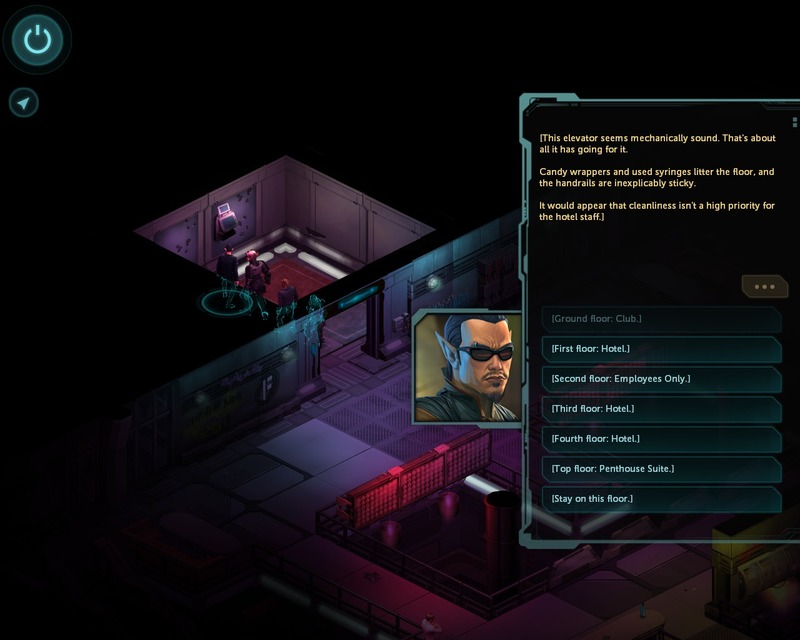
As you may remember, the main issues with the OC’s missions were their corridor-ish maps that didn't leave room for different approaches, the lack of decking opportunities, and the checkpoint system that didn’t allow going back and forth between maps. Every single one of these flaws has been fixed. In Dragonfall, every level gives you the opportunity to you access the Matrix and do funny things, like taking control of turrets or spying on enemies with cameras, and there are lots of those excellent set-pieces where you have to cover a decker in combat. Some missions take place in multi-floor buildings, and while you shouldn’t expect maze-like levels, there is still considerably more to do in them than just run and gun. A few of them can even be completed without firing a single shot if you have the proper skills, and most have a few side objectives as well. Navigating around the maps is much smoother now, because the game properly turns off turn-based mode outside of combat. The last mission, in particular, is simply brilliant, and I wish there were more runs like it in the game – it’s actually almost a straight-up dungeon crawl, with multiple levels, navigating through dark tunnels, finding the means to tip the scales in your favour, while coming across lots of nasty-ass enemies that slowly chip away your medkits.
Speaking of skills, there are many more skill checks in Dragonfall. Some of these are still just for flavour, but there are significantly more of them that actually affect the game. Previously useless skills like Biotech now appear very often in dialogue, while Drone Control, etiquettes and Charisma allow you to get through many areas without having to resort to (direct) violence. It’s just a shame that the damn etiquettes are once again poorly balanced - for example, the [Shadowrunner] etiquette doesn’t have a single use in the entire game. A few of the skill checks are also rather Fallout 3-style [Intelligent], but fortunately that doesn’t happen often. One other thing that made me a bit sad was the inclusion of Astral Space checks for casters in certain dialogues. In Shadowrun PnP, Astral Space is a whole third gameplay space, just like meatspace and the Matrix, and while I understand that it would have been way too difficult to implement it properly in this game, reducing it to just a few dialogue checks here and there is nonetheless underwhelming.
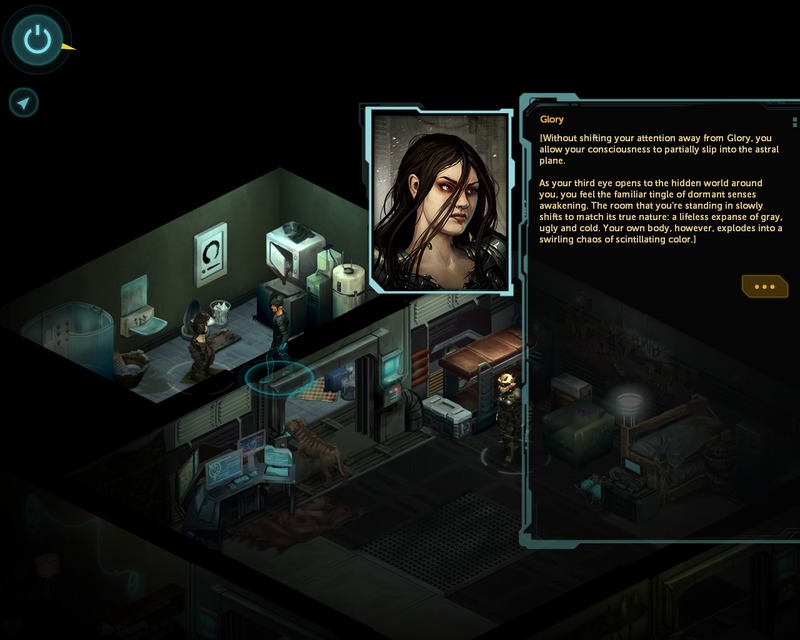
There were, however, two more problems with the missions in DMS, which are unfortunately still around to some extent in Dragonfall.
The first problem was difficulty. The difficulty in DMS was for the most part non-existent, with a few exceptions that still didn’t up it all that much. The good news is that, overall, the difficulty in Dragonfall is considerably higher, and much more consistent – it is more or less on the same level throughout the game, unlike DMS where it was vaguely sinusoidal. The campaign has a few set-pieces that are actually very challenging – a highlight being one shootout where you face high-level security, while your decker is on a time limit to shut off their reinforcements. The overall encounter design is much better as well - you no longer face the same mob of Lone Star gunmen over and over again. Almost every enemy group now has various casters and specialists, and there are also more battles against paranormal animals. Enemies have tangibly better stats on higher difficulties, and your party members will require proper usage of buff/debuff spells and items to face them on an equal footing. You blow through medkits much faster than in DMS, and there are significantly fewer opportunities for summoning spirits from the environment. To compensate for this, Dragonfall's maps have significantly more supplies scattered around, which makes me wish there was a way to distribute them to other party members outside of combat.
I did say difficulty was still a problem, and unfortunately, two significant issues with it remain: the Heal Wound spell is as broken as ever, and the enemy AI is as retarded as ever. I have absolutely no idea who the hell decided to keep the hard-coded routine that makes enemies never use more than one offensive action per turn, but he should be yelled at. Seriously, I mean it. There’s nothing that keeps the difficulty down more than this – even if you are severely outnumbered, your team still effectively has more actions per turn than the enemy, and it is downright absurd when you see a foe shoot you once and end his turn, even though you know he has 4 action points because a flashbang that hit him on a different occasion for -3AP didn’t knock him out. If the AI was actually using its potential to the fullest, Dragonfall might have actually been a very challenging game. I have no idea why they couldn't make the “Very Hard” difficulty setting remove this "enemy action limit".
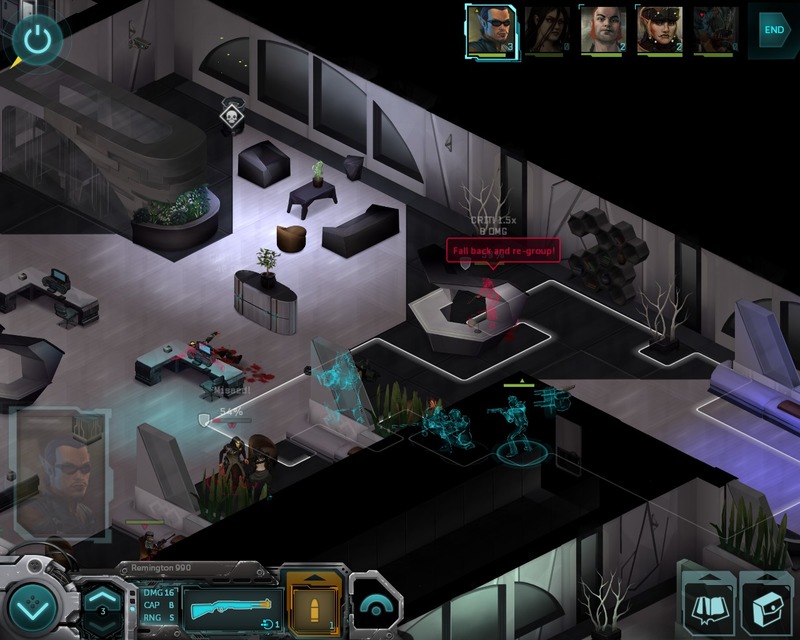
Apart from the difficulty, there's also the issue of reactivity and consequences to actions. Again, DMS didn’t really have any of that, and some of the fake choices it presented were simply sad. Dragonfall goes both ways here. On one hand, it does address the problem to some extent, with more reactivity in dialogues and some short-reaching consequences within missions. However, with very few exceptions, you can forget about long-reaching consequences that carry through between missions, which is infuriating because there are certain situations in the game that BEG for it. My “favourite” example, I think, is one point where you can decide whether to purge or spare a bunch of ghouls in a sewer. You later return to said sewer to stop some Evildoers™, where you might think “hoho, time for some ghoul action” if you let them live previously. But no. There is nothing. Not even some dead evildoers or ghoul corpses, NOTHING. There are a few more instances like this, some of which are downright stupid, but I think this one illustrates the point nicely.
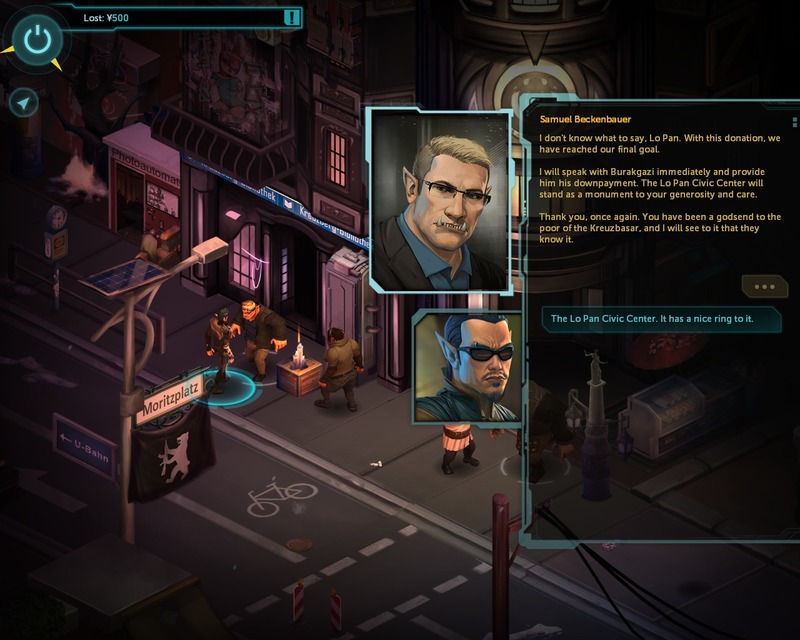
With that aside, let’s say a few words about Dragonfall’s narrative and setting. The main storyline is unrelated to DMS and follows a different protagonist. Just like everything else in the game, it is fairly consistent, and surprisingly solid in the long run. The beginning is rather generic – a job that was supposed to be a milk run turned out to be much more than you bargained for, one of your buddies died, stuff is after your butt and you must UNRAVEL CONSPIRACIES! You might question a few of the details in the story along the way, point out a few inconsistencies, but the way it is wrapped up is very satisfying and resolves most of the earlier doubts. The writing quality is more or less solid all around as well, with robust descriptions and long dialogues, although I would say it is slightly worse than the first half of DMS. There is however one plot hook that fails outright - the player's motivation.
You see, apparently you are very explicitly supposed to care about the party member that dies in the intro. Throughout the course of the game, everyone keeps telling you how very important she was for the entire community of your hub, how everyone is super-sad about her death, how you and her actually go back a long time, and how you should seek vengeance. Okay, I can definitely feel motivated to go on by having evildoers after my butt. But why the hell should I be expected to care about an NPC that I haven’t known for even half an hour before she got wasted?
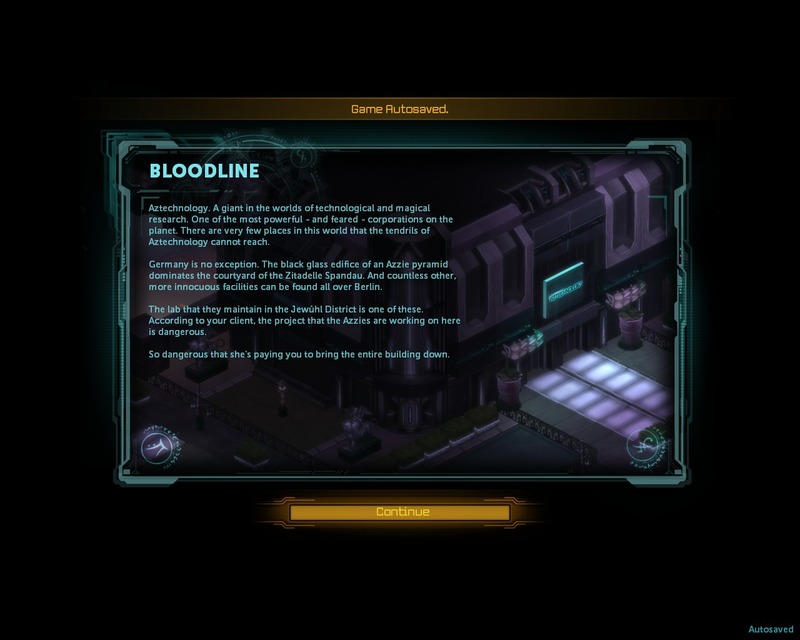
Finally, the setting. Berlin in the 2050s is called the “Flux State”, fully anarchist and ruled by no one, not even by the megacorps or the great dragons. Its citizens are organised in self-contained districts called kiezes. Your hub is the Kreuzbasar kiez, in today’s Kreuzberg. There are many name-drops of actual places in Berlin in the game, and characters randomly add expressions in German to drive the point home. I thought the Berlin setting was fairly well presented and preserved, and most of the additions in German were properly capitalised and spelled, except for a few cases like “of mein Vater”. Dragonfall also uses a lot of environmental storytelling in its maps, showing a lot but not telling much. This is achieved mostly through clever placement of art deco or Checkpoint Charlie-esque crossing points and signs. There are also loads of intriguing graffiti all around the place, my personal favourites definitely being “Soykaf ist Menschen!” and “Solidarność!”.
Running like Clockwork
There's not much to say about the game’s audiovisual side, as it simply retains all the high production qualities that Dead Man’s Switch had. The isometric graphics are as beautiful as before, with some some new map tiles, while the music once again kicks ass, recycling some of the original soundtrack’s best tunes (like Shoot Straight or Blood Hounds) and also introducing some new ones.
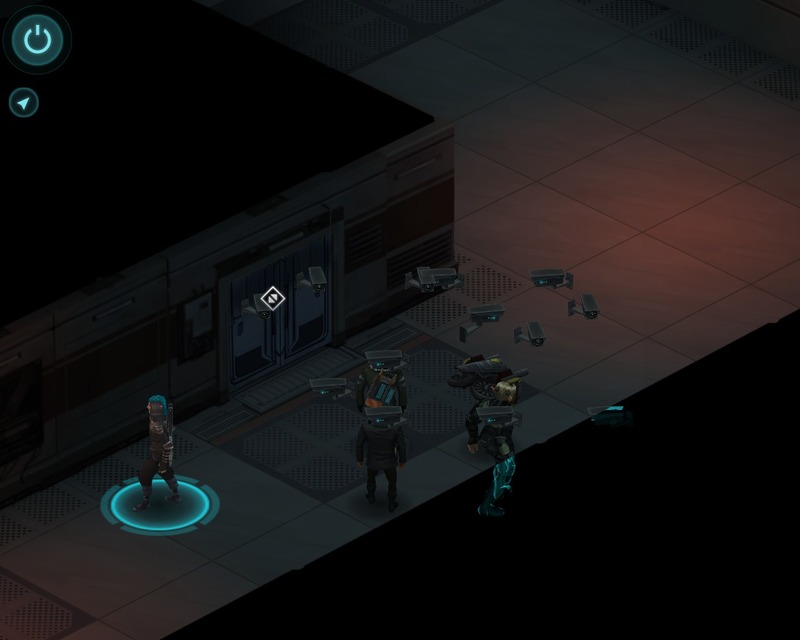
Unfortunately, when I said that Dragonfall is SRR++, that was also true with regard to bugs. There are many bugs in this game, mostly with UI and functionality. There are also a few bugged skill checks that you can pass with a stat that you don’t have, the rigging interface sometimes decides to vanish after activating, hotspots tend to disappear, etc. There was one particularly funny moment when changing between floors made all the cameras from the second floor suddenly appear bunched up on the first floor. That said, I personally haven’t found any gamebreaking bugs in Dragonfall, and even if they are there, it is fortunately rather easy to get around them using the savegame rewinding function. Like I said, the save system actually works much better than anticipated, although it does have hiccups from time to time, like in one mission when it swallowed up a semi-crucial NPC after a reload. On a more positive note, the game has much, much fewer typos than there were in vanilla DMS.
Deal with a Dragon
Dragonfall was precisely what I wanted it to be. A vastly improved Dead Man’s Switch with more content, but the same gameplay. I’d say that you should definitely go ahead and buy it if you liked the original campaign, but you might also want to give it a shot if you disliked DMS for one reason or another.
There is one thing, however, that really needs to be said here. Whoever was in charge of the marketing for Dragonfall needs to be flogged. What I mean is how it was constantly referred to as “DLC” before its release. This really couldn’t be more inaccurate. The original campaign took me 13 hours to finish on my first playthrough, but Dragonfall took me 23. This is not "DLC", but a fully fledged old-school expansion pack, just like Brood War was to Starcraft.
Finally, I’d also like to say that I really wouldn’t mind if Harebrained stuck with this formula. That is, keep the engine and just release new campaigns with improvements and new features every now and again. They've showed with Dragonfall that they know how to learn from their mistakes, and they could potentially produce something truly great if they kept improving on the current state of the game. And you know, I would be pretty happy if Shadowrun Returns could take me on a tour of the Renraku Arcology...
Shadows of Europe
Shadowrun Returns, with its Dead Man’s Switch campaign, was released last year and met with a resoundingly Good For What It Is™ reaction. Some people appreciated the effort that was put into the game and its ratio of price to content, while others regarded it as something rather half-arsed.
However, I think both groups were curious to see how the game's second campaign, which was set in Berlin and promised to be less linear, would turn out. The level of curiosity rose steadily as the Berlin campaign, which was dubbed Dragonfall, was postponed over and over again because Harebrained Schemes had decided to make it less of a “DLC” and more of an actual second campaign, rivalling Dead Man’s Switch in length and quality.
I was pretty hyped for it myself, because I found the original campaign enjoyable. I hoped that HBS would prove that man is actually a learning animal and iron out most of Dead Man’s Switch’s problems. Did they succeed? If you want to find out, read on!
The Re-Return of the Sixth World
There aren't a whole lot of new features in the game. In that respect, Dragonfall can be regarded as "SRR++". That is to say, there's simply more of everything. More guns, more spells, more mission variety, more cyberware, more pretty graphics, etc. Some of these additions are very welcome, like cyberware that's actually useful or revised chi spells, but others are ultimately still insufficient, especially melee and throwing weapons. Unarmed fighters now get access to brass knuckles - but there are only three types of them. Throwing weapons have also been expanded, and now include not just grenades but also low-tech weapons, which inflict low damage but allow many special attacks. Once again, however, there are only two types - throwing knives and shurikens. More equipment would have been greatly appreciated, but at least now it’s actually useful to assign Karma into some skills that were completely worthless earlier.

The game's party management has been greatly improved. You can now use your buddies to jack into the Matrix even outside of combat, smash through doors, hack consoles via the dialogue interface, etc. The companions you take along with you for each mission gain some more personality this way, and you feel like you are controlling an actual team instead of a protagonist with three combat bots. Speaking of terminals, the game now employs some interface elements from a more civilised era of gaming - namely, text parsers and keypads. If you want to search for something in a database, you now have to input the query manually, and the same is true for accessing anything locked with passwords and number combinations. This opens up the way for fun little mini-puzzles and info-mining sequences.
The last and most important addition is the inclusion of a savegame system. Yup, that’s right, no longer will you have to slog through checkpoints at the beginning of every scene, and no longer will you need to re-do entire levels because your PC crashed when boarding that elevator in Telestrian’s office. I was rather sceptical at first that the savegame system would be implemented properly - apparently, it was one of the main reasons why Dragonfall was continuously postponed, and so I was sure there was going to be some "catch" that would limit its functionality. Turns out there is no catch, and it works exactly like it should, hallelujah. You can save anytime, anywhere, in and outside combat, while the game still does autosaves/checkpoints of its own, and retains the ability to “rewind” your saves to previous checkpoints.

So...yeah. That’s all in terms of features, really. It might not look like much, and frankly, it isn’t. Most of Dragonfall’s differences and improvements over DMS lie in its overall campaign structure.
Nicht Schießen!
If there is one thing that I really like about Dragonfall in general, it’s how consistent it is, both in regard to its source material, and with its internal pacing. While DMS started as a cool noir crime story with bad combat and morphed into bollocks with nonsensical fan service and better combat, Dragonfall starts with an actual shadowrun, then sends you through plenty more shadowruns, and ends with a shadowrun.
Generally, this campaign is much more true to the traditional Shadowrun pen and paper experience than DMS was. You now have a fixer (a guy who handles logistics and job offers for you) in your safehouse, and a team of buddies instead of just mercs for hire. You can choose which missions you want to take, and there’s a hub with shops and NPCs outside your HQ. Mind you, it's all fairly simplistic - you never really have to perform your own legwork and intel gathering before going on a run, so don’t expect any open world business. Still, there's now significantly more “breathing space” and a sense of freedom between missions.

What exactly is there to do between missions, you ask? Obviously, shopping for gear, but you will also be inspecting your HQ’s computer for data and talking to various NPCs scattered across the hub. The safehouse computer is a neat little thing. Its primary use is to serve as a database of jobs you can take, but you can also use it to read emails from various people between missions, post stolen items and data for sale, and read the Shadowland BBS, a kind of a shadowrunner community network. The BBS discussions are only for flavour, but they imbue the game world with a tremendous amount of believability. Some of them are about your recent actions, but others are completely unrelated, creating the illusion that your team is only one of many out there in the shadows. The NPC dialogue in the main hub is also just for flavour for the most part, only rarely yielding a small side objective or additional karma. This holds true not just for miscellaneous NPCs, but also for your companions. I thought it was rather refreshing that I wasn’t forced to act like a personal therapist and listen to everyone’s life stories; if you find someone interesting, good, you can keep checking on them regularly. If you don’t, well, screw that guy.
Speaking of companions, the game offers a pretty colourful crew for you to choose from – a troll ex-commando, an oldguy punk band frontman turned shaman, a hotshot decker and a combat medic with cyberclaws and a Dark Past™. They seem a little Bioware-whiny and annoying at first, but become more likeable over the course of the game. You can influence their attitudes and decisions during your "therapy sessions", although you never have a hand in picking their gear and skills, except for secondary items like medkits/grenades. Just like in DMS, you can take three party members with you for each mission. The companions come free of charge, but if you wish, you can hire mercs instead. Unfortunately, there are only five mercs available, and only two of them aren’t objectively worse than your companions, which means that you never really need to reconsider your party composition.
Once you pick your dudes and have gotten a job, then it’s time to go on a shadowrun. This is where the fun starts, and where Dragonfall shows just how much it has improved over Dead Man’s Switch. The very fact that you always have two or three active jobs from which you can choose is already a massive improvement that grants you a sense of actual agency. They are generally independent from the main plot, which further drives home the Shadowrun theme of doing various jobs for various people. The missions are nicely varied, and include assassination, data theft, sabotage, etc. They often have twists at crucial moments, and take place in all sorts of secret labs, corp offices and shady clinics. And here’s the crucial thing: they are all insanely fun to do. Commando-style kicking down the door, blowing everything to hell, getting shit done and pulling out hasn’t been so fun to me since Crusader: No Regret. The most important factor that makes Dragonfall’s missions so much cooler than DMS’s is their hundred times better level design.

As you may remember, the main issues with the OC’s missions were their corridor-ish maps that didn't leave room for different approaches, the lack of decking opportunities, and the checkpoint system that didn’t allow going back and forth between maps. Every single one of these flaws has been fixed. In Dragonfall, every level gives you the opportunity to you access the Matrix and do funny things, like taking control of turrets or spying on enemies with cameras, and there are lots of those excellent set-pieces where you have to cover a decker in combat. Some missions take place in multi-floor buildings, and while you shouldn’t expect maze-like levels, there is still considerably more to do in them than just run and gun. A few of them can even be completed without firing a single shot if you have the proper skills, and most have a few side objectives as well. Navigating around the maps is much smoother now, because the game properly turns off turn-based mode outside of combat. The last mission, in particular, is simply brilliant, and I wish there were more runs like it in the game – it’s actually almost a straight-up dungeon crawl, with multiple levels, navigating through dark tunnels, finding the means to tip the scales in your favour, while coming across lots of nasty-ass enemies that slowly chip away your medkits.
Speaking of skills, there are many more skill checks in Dragonfall. Some of these are still just for flavour, but there are significantly more of them that actually affect the game. Previously useless skills like Biotech now appear very often in dialogue, while Drone Control, etiquettes and Charisma allow you to get through many areas without having to resort to (direct) violence. It’s just a shame that the damn etiquettes are once again poorly balanced - for example, the [Shadowrunner] etiquette doesn’t have a single use in the entire game. A few of the skill checks are also rather Fallout 3-style [Intelligent], but fortunately that doesn’t happen often. One other thing that made me a bit sad was the inclusion of Astral Space checks for casters in certain dialogues. In Shadowrun PnP, Astral Space is a whole third gameplay space, just like meatspace and the Matrix, and while I understand that it would have been way too difficult to implement it properly in this game, reducing it to just a few dialogue checks here and there is nonetheless underwhelming.

There were, however, two more problems with the missions in DMS, which are unfortunately still around to some extent in Dragonfall.
The first problem was difficulty. The difficulty in DMS was for the most part non-existent, with a few exceptions that still didn’t up it all that much. The good news is that, overall, the difficulty in Dragonfall is considerably higher, and much more consistent – it is more or less on the same level throughout the game, unlike DMS where it was vaguely sinusoidal. The campaign has a few set-pieces that are actually very challenging – a highlight being one shootout where you face high-level security, while your decker is on a time limit to shut off their reinforcements. The overall encounter design is much better as well - you no longer face the same mob of Lone Star gunmen over and over again. Almost every enemy group now has various casters and specialists, and there are also more battles against paranormal animals. Enemies have tangibly better stats on higher difficulties, and your party members will require proper usage of buff/debuff spells and items to face them on an equal footing. You blow through medkits much faster than in DMS, and there are significantly fewer opportunities for summoning spirits from the environment. To compensate for this, Dragonfall's maps have significantly more supplies scattered around, which makes me wish there was a way to distribute them to other party members outside of combat.
I did say difficulty was still a problem, and unfortunately, two significant issues with it remain: the Heal Wound spell is as broken as ever, and the enemy AI is as retarded as ever. I have absolutely no idea who the hell decided to keep the hard-coded routine that makes enemies never use more than one offensive action per turn, but he should be yelled at. Seriously, I mean it. There’s nothing that keeps the difficulty down more than this – even if you are severely outnumbered, your team still effectively has more actions per turn than the enemy, and it is downright absurd when you see a foe shoot you once and end his turn, even though you know he has 4 action points because a flashbang that hit him on a different occasion for -3AP didn’t knock him out. If the AI was actually using its potential to the fullest, Dragonfall might have actually been a very challenging game. I have no idea why they couldn't make the “Very Hard” difficulty setting remove this "enemy action limit".

Apart from the difficulty, there's also the issue of reactivity and consequences to actions. Again, DMS didn’t really have any of that, and some of the fake choices it presented were simply sad. Dragonfall goes both ways here. On one hand, it does address the problem to some extent, with more reactivity in dialogues and some short-reaching consequences within missions. However, with very few exceptions, you can forget about long-reaching consequences that carry through between missions, which is infuriating because there are certain situations in the game that BEG for it. My “favourite” example, I think, is one point where you can decide whether to purge or spare a bunch of ghouls in a sewer. You later return to said sewer to stop some Evildoers™, where you might think “hoho, time for some ghoul action” if you let them live previously. But no. There is nothing. Not even some dead evildoers or ghoul corpses, NOTHING. There are a few more instances like this, some of which are downright stupid, but I think this one illustrates the point nicely.

With that aside, let’s say a few words about Dragonfall’s narrative and setting. The main storyline is unrelated to DMS and follows a different protagonist. Just like everything else in the game, it is fairly consistent, and surprisingly solid in the long run. The beginning is rather generic – a job that was supposed to be a milk run turned out to be much more than you bargained for, one of your buddies died, stuff is after your butt and you must UNRAVEL CONSPIRACIES! You might question a few of the details in the story along the way, point out a few inconsistencies, but the way it is wrapped up is very satisfying and resolves most of the earlier doubts. The writing quality is more or less solid all around as well, with robust descriptions and long dialogues, although I would say it is slightly worse than the first half of DMS. There is however one plot hook that fails outright - the player's motivation.
You see, apparently you are very explicitly supposed to care about the party member that dies in the intro. Throughout the course of the game, everyone keeps telling you how very important she was for the entire community of your hub, how everyone is super-sad about her death, how you and her actually go back a long time, and how you should seek vengeance. Okay, I can definitely feel motivated to go on by having evildoers after my butt. But why the hell should I be expected to care about an NPC that I haven’t known for even half an hour before she got wasted?

Finally, the setting. Berlin in the 2050s is called the “Flux State”, fully anarchist and ruled by no one, not even by the megacorps or the great dragons. Its citizens are organised in self-contained districts called kiezes. Your hub is the Kreuzbasar kiez, in today’s Kreuzberg. There are many name-drops of actual places in Berlin in the game, and characters randomly add expressions in German to drive the point home. I thought the Berlin setting was fairly well presented and preserved, and most of the additions in German were properly capitalised and spelled, except for a few cases like “of mein Vater”. Dragonfall also uses a lot of environmental storytelling in its maps, showing a lot but not telling much. This is achieved mostly through clever placement of art deco or Checkpoint Charlie-esque crossing points and signs. There are also loads of intriguing graffiti all around the place, my personal favourites definitely being “Soykaf ist Menschen!” and “Solidarność!”.
Running like Clockwork
There's not much to say about the game’s audiovisual side, as it simply retains all the high production qualities that Dead Man’s Switch had. The isometric graphics are as beautiful as before, with some some new map tiles, while the music once again kicks ass, recycling some of the original soundtrack’s best tunes (like Shoot Straight or Blood Hounds) and also introducing some new ones.

Unfortunately, when I said that Dragonfall is SRR++, that was also true with regard to bugs. There are many bugs in this game, mostly with UI and functionality. There are also a few bugged skill checks that you can pass with a stat that you don’t have, the rigging interface sometimes decides to vanish after activating, hotspots tend to disappear, etc. There was one particularly funny moment when changing between floors made all the cameras from the second floor suddenly appear bunched up on the first floor. That said, I personally haven’t found any gamebreaking bugs in Dragonfall, and even if they are there, it is fortunately rather easy to get around them using the savegame rewinding function. Like I said, the save system actually works much better than anticipated, although it does have hiccups from time to time, like in one mission when it swallowed up a semi-crucial NPC after a reload. On a more positive note, the game has much, much fewer typos than there were in vanilla DMS.
Deal with a Dragon
Dragonfall was precisely what I wanted it to be. A vastly improved Dead Man’s Switch with more content, but the same gameplay. I’d say that you should definitely go ahead and buy it if you liked the original campaign, but you might also want to give it a shot if you disliked DMS for one reason or another.
There is one thing, however, that really needs to be said here. Whoever was in charge of the marketing for Dragonfall needs to be flogged. What I mean is how it was constantly referred to as “DLC” before its release. This really couldn’t be more inaccurate. The original campaign took me 13 hours to finish on my first playthrough, but Dragonfall took me 23. This is not "DLC", but a fully fledged old-school expansion pack, just like Brood War was to Starcraft.
Finally, I’d also like to say that I really wouldn’t mind if Harebrained stuck with this formula. That is, keep the engine and just release new campaigns with improvements and new features every now and again. They've showed with Dragonfall that they know how to learn from their mistakes, and they could potentially produce something truly great if they kept improving on the current state of the game. And you know, I would be pretty happy if Shadowrun Returns could take me on a tour of the Renraku Arcology...
There are 105 comments on RPG Codex Review: Shadowrun: Dragonfall











